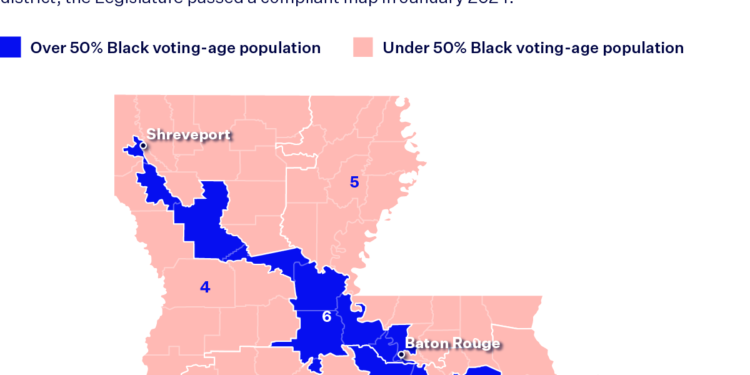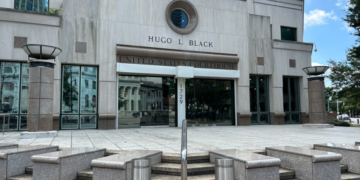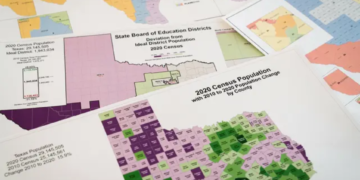Img source: democracydocket.com
May 15, 2024 Story by: Publisher
A federal court ruling on Tuesday put a stop to Louisiana’s utilization of a congressional map, recently enacted, which had been redesigned to incorporate a second district with a majority of Black voters.
In a split 2-1 decision, the three-judge panel of the U.S. District Court in Monroe, Louisiana, determined that Senate Bill 8, outlining the redistricting of congressional districts within the state, violated a clause in the 14th Amendment that guarantees equal protection under the Constitution.
The case is poised to reach the Supreme Court, adding another test to the Voting Rights Act.
“Having weighed the evidence presented at trial, the arguments from both sides, and the relevant legal framework, we find that District 6 of SB8 breaches the Equal Protection Clause,” District Judges Robert R. Summerhays and David C. Joseph, both appointed by former President Donald Trump, articulated in the court’s ruling. Source: NBCNews
The judges ordered the state to abstain from using the map “in any forthcoming elections.”
A hearing is scheduled for May 6 to deliberate on the subsequent steps.
In response, Paul Hurd, legal counsel for the voters contesting the map, expressed appreciation “for the Court’s ruling in favor of the twelve courageous Plaintiffs who contested the new districting plan.”
The plaintiffs contended in their lawsuit challenging the redistricting map that “the State engaged in textbook racial gerrymandering” and that it breached civil rights safeguards under the 14th and 15th amendments by creating a second majority-Black district to comply with an earlier court directive.
The Louisiana secretary of state’s office designated May 15 as the deadline for finalizing the state’s congressional map for this year’s elections but refrained from commenting on Tuesday’s ruling.
The map underwent revision, with Governor Jeff Landry, a Republican, endorsing it into law in January subsequent to a federal court ruling in 2022 that deemed the Legislature’s earlier redistricting plan unlawfully disenfranchised Black voters.
Although Louisiana boasts a Black population comprising nearly one-third of its demographic, five of its six congressional districts predominantly represent white constituents.
The new map would diminish the Black voting-age population in Democratic Representative Troy Carter’s district to 51%, while delineating a new 6th Congressional District as a narrow strip from Shreveport to Baton Rouge. The Black voting-age population in that district would be 53%.
Carter criticized Tuesday’s ruling and urged the Supreme Court to “rectify this immediately.”
In a dissenting perspective, Judge Carl E. Stewart highlighted the new map’s endeavor to address objections to the preceding one raised under the Voting Rights Act.
“I am concerned that the majority’s decision overlooks the history behind S.B. 8 and, consequently, sets us up to repeat this cycle,” noted Stewart, appointed by President Bill Clinton.
He underscored that the new map was “precisely tailored to advance the State’s compelling interests” in adhering to the Voting Rights Act’s protections against discriminatory voting practices.
The American Civil Liberties Union, an involved party, signaled its intention to challenge the ruling.
“This ruling doesn’t alter the fact that a second Black majority district is imperative for Black voters in Louisiana to achieve fair and equitable representation,” emphasized Sarah Brannon, deputy director of the ACLU’s Voting Rights Project. “We will persist in advocating for the fundamental right of Black Louisianians, whose voting influence has consistently and substantially been diluted.”
The outcome of the legal dispute over Louisiana’s map could wield considerable influence in November, when Republicans will be defending their slim majority in the House.

















